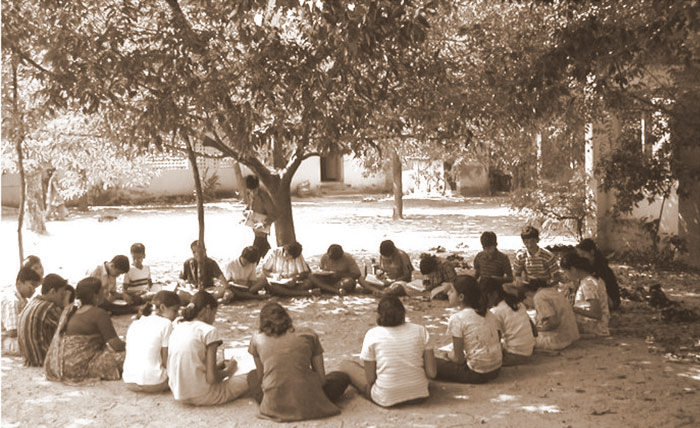VIEWPOINT
On Teacher’s Day a professor has revealed his ‘subjective’ experiences, and articulated the meaning of being a teacher – the call of the vocation and its essential spirit.
Avijit Pathak is a Professor of Sociology at JNU, New Delhi.

You are concerned with outer shells,
I on inner truths dwell.
You explore the book of knowledge,
I pursue transcendental thought,
You are on the trail of God, I am
the very image of God…
– Allama Iqbal
[dropcap]I[/dropcap] think I am fortunate because I have found my vocation; it gives me inner fulfillment and a purpose of existence; and at the same time, it enables me to earn my livelihood. When ‘alienation’ is normal, and for a large section of the population, there is no unity of ‘work’ and ‘play’, it is really great to feel happy about what I do: my practice of teaching, and my constant engagement with ideas, practices and human souls. On this special day I feel like sharing my understanding of the meaning of being a teacher. No, I am not going to write anything bookish. My ‘subjective’ experiences would guide me throughout this brief essay. And I do not feel apologetic about it because at its peak moment life strives for the union of the ‘subjective’ and the ‘objective’.
Cherishing a feasible utopia
Yes, I teach sociology. And I know that in the age of specialization and distinctive identity of an academic discipline I am required to teach the ‘subject’–its diverse domains of enquiry, its core texts, its substantial debates, and its methodological/epistemological principles. I have been doing it with great joy. However, I retain my spirit and overcome even the slightest trace of boredom (a common feature in this fast world with compulsive performance) because I allow myself to be guided by a vision, a ‘utopia’ and a pedagogic dream. Teaching is not merely the ‘successful’ dissemination of facts, theories and skills. Teaching is essntially an invitation; it ought to inspire the young, enchant their minds and souls, and take them to a new world. In this process I do two things, apart from sharpening my knowledge of the ‘subject’.First, as I allow myself to be open and receptive. Paulo Freire talks to me, Rabindranath Tagore whispers into my ears, and Ramakrishna’s tales enter my being. The spirit of dialogue, the art of engagement with nature, and the power of metaphors to communicate deep philosophies–my mode of teaching sociology acquires a new meaning through these pedagogic practices. In the process of teaching sociology as a ‘specialized’ discipline, I tend to become a keen student of creative pedagogy and educational philosophy. Second, I know that I cannot reduce sociology into a mere ‘official syllabus’. No matter whether I teach sociological thinkers or social practices/institutions like caste and patiarchy, nothing can be reduced into yet another piece of soulless information. I need a vision or a feasible utopia to encourage my students to strive for a better world. How do they study Durkheim’s sharp reflections on ‘anomic suicide’, Weber’s anguish over growing ‘disenchantment’ in the age of modernity, Marx’s moral critique of capitalism through the concepts like ‘alienation’ and ‘commodity fetishism’?

Let teaching exist as an art – a kind of music. I cherish its poetry, its madness.
Possibly, a quest for a new society – egalitarian, ecologically sensitive and spiritually cultivated–enables us to give a refreshingly new meaning to the ‘texts’ we study. Yes, to be a teacher is to be reflexive and passionate; to teach is to sing the songs of a new world; to teach is to inspire…
An art, not a technique
My long experience of teaching has taught me a great lesson – teaching is not a technique; it is an art. I do not deny the great importance of background work – the rigorous preparation, the planning and time management. Yet, there is an element of creative mystery in the actual process of teaching. Not everything can be acquired through ‘training’–the ‘handbook of teaching’, the hygienic formula or the standardized guideline.
An engagement with young learners is a living reality; its aliveness and subjectivities cannot be predicted; every moment in the creative act of teaching generates its own possibilities and challenges. Let me state my point with an example. I am teaching Karl Marx; and then suddenly like a flash of truth I see the children of construction workers with torn clothes and malnourished faces looking at the fancy cars passing through the streets of Delhi. I stop defining ‘class’, ‘class conflict’ and ‘alienation’. I stop quoting from The Communist Manifesto and Economic and Philosophic Manuscripts of 1844. Instead, I ask my students to feel how Marx would have looked at it: comforts for the rich, and misery for the poor. I see wonder, curiosity and anger in the eyes of my students. Books become real; philosophy becomes experiential; and a lecture defies all sorts of ‘planning’. In fact, a teacher grows every day; there is nothing fixed for ever. To teach meaningfully is to acquire the courage to jump, to defy the conventional formula, to experiment, and to celebrate creative anarchy.
In fact, I believe that true order emerges out of this anarchy. Yes, as an art, teaching needs both–training as well as De-schooling, learning as well as unlearning, order as well as mystery. This makes every class unique–somewhat unpredictable. Without this creative surplus teaching becomes dull, routinized, predictable, an exercise in completing the syllabus. My worry is that the overuse of PPT (power point presentation) is fast destroying the beauty of teaching–the symmetry of a meaningful eye-to eye contact between the teacher and her students, intuitive insights, the flash of truth, the charm of a lyrical/argumentative oral discourse, and the vulnerability of the teacher.
Instead, everything that is alive, creative and mysterious in the classroom is allowed to die. There is another danger I need to talk about.These days the field of education – particularly, school education–has been colonized by techno-managers and all sorts of fancy NGOs. Look at their market-friendly vocabulary: ‘input’, ‘output’, ‘life-skills’, ‘leadership development’, and all sorts of ‘modules’. The flourishing ‘workshop business’ instructs the teachers how to prepare the lecture with a mathematical division of time – statement of the problem, purpose of the lesson, key concepts and tag words, and measurement of the ‘output’. This technique, I believe, is ugly; it disempowes the teacher; it seeks to control what should should not be controlled–the flow of ideas, the spontaneity of the moment, the creative jump. Let teaching exist as an art – a kind of music. I cherish its poetry, its madness.
Power fails, love wins…
It is true that power (I mean the power to dominate, the power to exercise one’s will over others, the power to retain the inflated ‘ego’ with a sense of superiority) intoxicates and attracts man.Administrative power, political power, economic power – we see their practices and symbolism everywhere.
However, the grace of being a teacher is that it is not about power; it is about love; it is an engaged relationship; it is about collective nurturing and blooming. And I do believe that even if a teacher assumes the administrative role of a Dean or even a Vice-Chancellor he/she should not forget the call of the vocation. It is tragic that there are teachers who love this power, and, as a result their engagement with students and colleagues becomes polluted. As a teacher, I have felt repeatedly that the most important reward in my life is the unconditional love that I have received from my students.
Well, I know that I have not always succeeded; it is possible that there are students who have not felt easy with me; and yes, I too have become angry and even rebuked my students. Yet, I have felt the futility of power in this relationship. Love makes it possible – students attend classes with absolute voluntarism (I am against the bureaucratic practice of mandatory attendance), they submit their assignments, discipline is born out of freedom, and many of them remain in touch with me even after leaving the university.
To teach is to love. To teach is to heal. To teach is to nurture human souls.
A telephone call from a distant land, a hand -written letter filled with memories and experiences, a wonderful book as a gift of love, and a deep communion–they make me believe that life is worth-living. At times, I see a ‘powerful’ Minister surrounded by security guards and police officers and all sorts of subordinates; and I begin to laugh. There is actually no relationship, no authentic touch, no unconditional belonging. These constables and security guards are just doing their official ‘duties’; and tomorrow if this Minister is out of power none would approach him, newspapers would not publish his picture, and billboards would not advertise his ‘performance’. Unlike this officially designed/temporal power, a teacher who is true to his/her vocation carries the lamp of truth. The love he/she receives is unconditional. One who has not tasted it would not realize its worth. To teach is to love. To teach is to heal. To teach is to nurture human souls.














